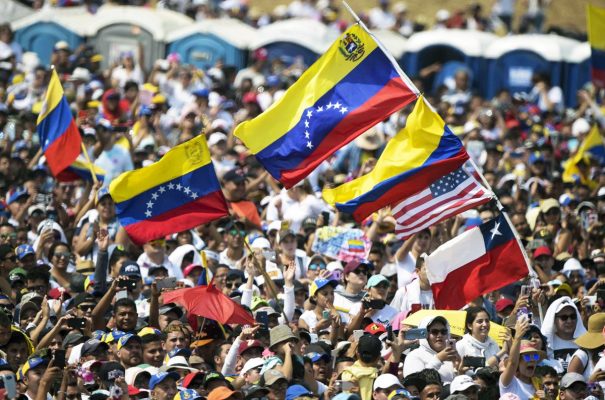
Ahead of fresh demonstrations Tuesday, Venezuela is on edge following a clash with authorities resulting in four fatalities and numerous injuries during protests against President Nicolas Maduro’s contested victory in the recent election.
Security forces on Monday deployed tear gas and rubber bullets against irate protesters who alleged electoral fraud, flooding the streets with chants of “Freedom, freedom!” and “Down with this government!”
Some protesters tore down and incinerated Maduro’s campaign posters, while statues of Hugo Chavez, the deceased authoritarian socialist who governed Venezuela for over a decade before handpicking Maduro as his successor, were toppled.
On Tuesday, Attorney General Tarek William Saab reported the arrest of 749 “criminals” involved in the protests, charged with offenses ranging from resisting authority to, in more severe cases, terrorism.
The opposition vehemently disputes the results of Sunday’s election, which official sources claim Maduro won with 51.2 percent of the vote compared to Edmundo Gonzalez Urrutia’s 44.2 percent.
Former opposition leader Maria Corina Machado, who was replaced by Urrutia after being barred from running by courts aligned with Maduro, presented voting records indicating an insurmountable lead for Urrutia.
According to opposition figures, Gonzalez Urrutia received 6.27 million votes, overshadowing Maduro’s 2.75 million.
The Organization of American States accused the election results of being marred by “exceptional manipulation” favoring Maduro.
The protests on Monday left 44 people injured, mostly with gunshot wounds, according to the National Hospital Survey, an organization monitoring health crises in Venezuelan hospitals.
Of the casualties, two were in Aragua, one in Caracas, while a NGO, Foro Penal, reported another fatality in Yaracuy.
Expressing his concerns, Gonzalez Urrutia wrote that there had been multiple deaths, injuries, and detentions, urging security forces to cease the repression of peaceful demonstrations.
• ’Absolute loyalty’ –
The Defense Ministry disclosed that 23 military personnel sustained injuries.
Defense Minister Vladimir Padrino declared the armed forces’ unwavering support and allegiance to Maduro.
Machado called for families to assemble nationwide on Tuesday for peaceful demonstrations backing a transition of power.
Maduro’s campaign manager Jorge Rodriguez also called for massive marches commencing on Tuesday to celebrate their victory.
Heightened tensions led to the purported “kidnapping” of prominent opposition figure Freddy Superlano by unidentified officials, as reported by Voluntad Popular.
The Venezuelan elections encountered widespread concerns regarding government-induced fraud and political intimidation throughout the campaign.
The United Nations, United States, European Union, and various Latin American nations advocated for a transparent electoral process post-election, contrasting with China, Russia, and Cuba congratulating Maduro.
Nine Latin American countries collectively called for an impartial assessment of the election results with independent electoral observers present, with Chile’s president expressing incredulity over the outcome.
In response to the escalating situation, Peru recalled its ambassador, and Panama suspended relations with Venezuela, while Caracas announced the withdrawal of diplomatic staff from several countries including Argentina, Chile, Costa Rica, Panama, Peru, the Dominican Republic, and Uruguay.
• ’Bloodbath’ warning –
Independent polls had predicted Maduro’s defeat in Sunday’s election.
Maduro has ruled the once prosperous oil-rich nation since 2013. Under the weight of US sanctions and economic mismanagement, Venezuela’s GDP has plummeted by 80 percent over the last decade, prompting over seven million of its 30 million residents to seek refuge abroad.
Accusations have been raised against Maduro for incarcerating dissenters and oppressing the opposition in what is perceived as a growingly authoritarian regime.
Leading up to the election, Maduro had cautioned about potential violence in case of his loss.
The recent poll resulted from a pact struck last year between the government and opposition.
This agreement prompted the temporary relaxation of US sanctions imposed subsequent to Maduro’s disputed 2018 re-election, rejected by multiple Latin American and international entities as a farce.
Sanctions were reinstated following Maduro’s failure to adhere to the agreed-upon terms.
Despite holding the world’s largest oil reserves, Venezuela’s oil production capacity has significantly dwindled in recent times.
AFP
